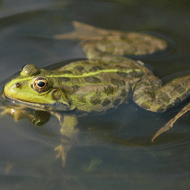
Scientists compare bacteria in different populations
Bacteria living on the skin of frogs could help protect them from deadly ranavirus, scientists have discovered.
A study by the University of Exeter and ZSL found that populations of frogs with a history of ranavirus outbreaks had distinct bacteria living on their skin, compared to those where no outbreaks had occurred.
Ranavirus can wipe out entire populations of European common frogs - the species most often seen in UK ponds - and it is one of many threats facing amphibians worldwide.
Scientists tested the skin bacteria of more than 200 wild European common frogs from 10 populations. Findings suggest the microbiome of individual frogs is generally more similar to that of others in the same population.
Amphibians can partially ‘curate’ their own microbiome by producing proteins that benefit specific bacteria, but they are limited to the bacteria that are available in their environment.
Dr Lewis Campbell said: “Ranavirus is widespread, but its presence in the environment doesn’t necessarily mean frogs become diseased – there appears to be some other factor that determines this.
“The skin is often the first infection point in ranavirus, and the first stage of the disease can be skin sores. It’s possible that the structure of a frog’s microbiome – the mix of bacteria on its skin – can inhibit the growth and spread of the virus so it can’t reach a level that causes disease.”
Researchers say the study demonstrates a clear link between the frog skin microbiome and disease. However, laboratory trials will help to determine whether a history of ranavirus infection causes the microbiome differences, or whether there are pre-existing differences that predispose some populations to infection.
Dr Xavier Harrison added: “There’s growing evidence that skin bacteria may protect amphibians from lethal pathogens such as chytrid fungus, and that we can develop cocktails of probiotic bacteria to prevent vulnerable individuals from contracting disease.
“Our work suggests that given enough effort and research, similar probiotic therapies may be effective against ranavirus.”



 The latest
The latest